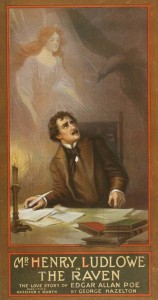Today’s theatrical release of James McTeigue’s The Raven, inspired by the life and writings of Edgar Allan Poe, is noteworthy for the ease with which it casts one of America’s best-known poets and writers as an action star. While other major poets during the past decade have been featured in serious biopics, including Allen Ginsberg in Howl (2010), John Keats in Bright Star (2009), and Sylvia Plath and Ted Hughes in Sylvia (2003), it’s hard to imagine any of them receiving the type of sensational, fictionalized portrayal that Poe does in The Raven. The macabre, unsettling nature of much of his writing, coupled with the misfortunes in his life and the mystery surrounding his death, makes Poe uniquely eligible among American writers for such super-sized big screen treatment—much as the historical circumstances of Abraham Lincoln‘s life, and his psychological complexities, make him uniquely eligible among U.S. presidents for full-blown fantasy treatments.
A further testament to the death grip of all things Poe on popular culture is that no English-language poet, with the exception of Shakespeare, has been depicted in television and cinema more often than Poe. Searching the Internet Movie Database reveals that The Raven is approximately the 54th movie or television show to feature the character of Poe, which itself pales in comparison to the 250 or so films and television programs in which Poe is credited as a writer.
The first film to feature Poe as a character is D.W. Griffith’s 1909 Edgar Allen [sic] Poe. The seven-minute production revolves around the appearance of a raven (at the 02:09 mark) to the cash-strapped Poe on a bust above the bed of his ill wife Virginia Clemm, which inspires him to write “The Raven.” After several attempts to sell the poem to different publishers, he finds one who accepts it. With the money he earns from the sale, Poe buys a blanket and other goods for his wife, only to find, upon his return, that she has died. The Edgar Allan Poe Society of Baltimore Web site notes of the film:
Although it was a failure as biography, it was happily successful at the box office and inspired a number of other silent films, including the The Raven (1912, American Eclair Company) and The Avenging Conscience (1914, another Griffith production). Poe continued to appear in the talkies, including The Man with a Cloak (1951, with Joseph Cotten as Poe) and The Torture Garden (1966).
Although McTeigue’s The Raven apparently shares nothing in common with Poe’s poem other than its title, many other films and television shows—not to mention works of literature—have adapted or parodied the poem since its 1845 publication. My favorite television adaptation of the poem easily is from the “Treehouse of Horror” episode from the second season (1990) of The Simpsons. James Earl Jones expertly narrates “The Raven,” while Homer is cast as the addled protagonist.
In a previous post I mentioned that one of my favorite literary parodies of “The Raven” is a Civil War poem titled “The Craven” that mocks General George McClellan. From the Catbird Seat will make it a point, come fall, to explore in more detail the many and varied literary parodies of “The Raven.” Until then, McTeigue’s The Raven will help ensure that Poe’s presence continues to be felt at movie theaters for . . . evermore.

